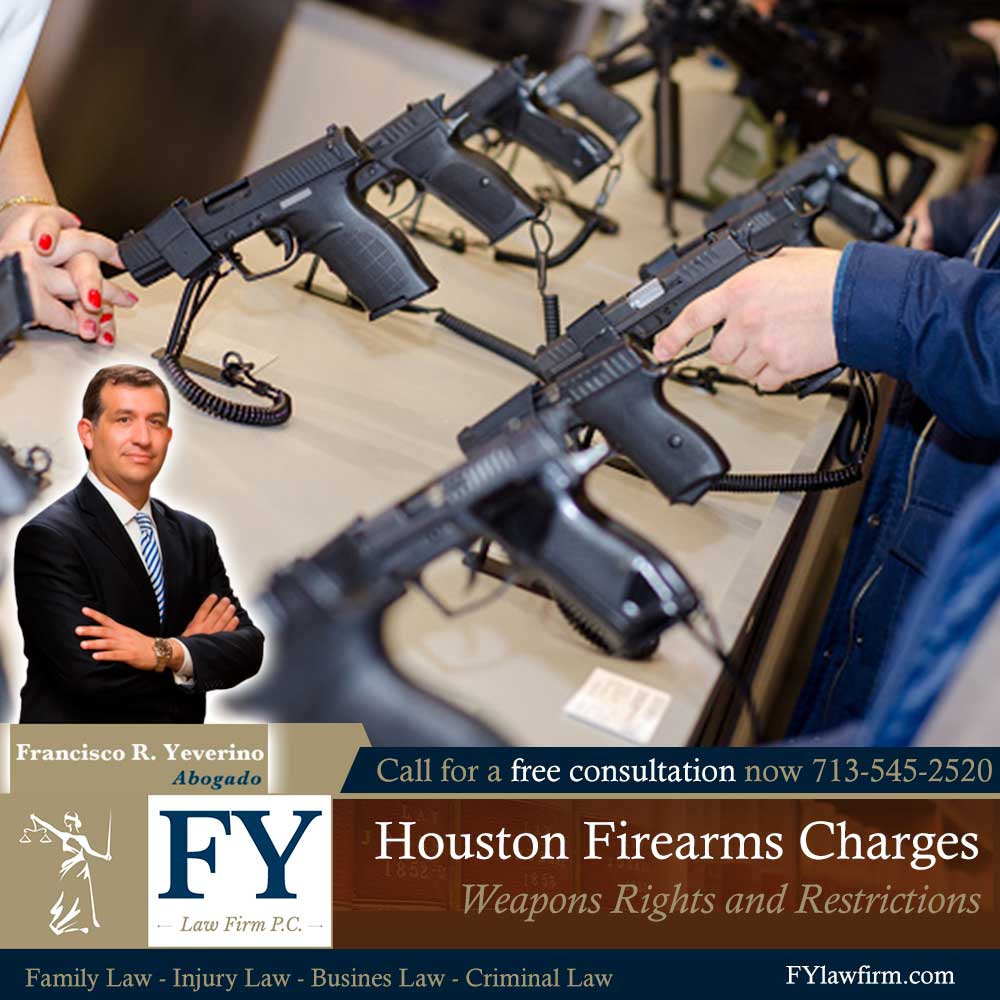
Firearms Charges in Houston
Weapons Rights and Restrictions
Carried. - A carried weapon is one that moves with you, or one you have in your possession. Having a knife hidden in a pocket, for example, constitutes carrying a weapon because whenever you move, the weapon moves with you. However, actually moving is not required. You can, for example, carry a weapon if you have it in your pocket while you are asleep.
Also, you can carry a weapon if it is not physically in your possession, but merely within easy reach or control. For example, you can carry a weapon if you have it hidden under your seat while driving a car or otherwise have it available for immediate use.
Concealed. - It's not enough for you to simply carry a weapon to be convicted of carrying a concealed weapon. The prosecutor must also prove the “concealed” part. Concealment means that a person would ordinarily not be able to view the weapon if that person met you on the street, or in the ordinary course of an interaction. Having a weapon that is only partially concealed, or one that is concealed from only a particular angle, is usually not enough to be convicted of carrying a concealed weapon, though state laws do differ on this point. For example, some states require that the entire weapon must be viewable by an ordinary person, and even partially concealing a weapon can be enough to be convicted of carrying a concealed weapon.
Weapons Rights and Restrictions. - The right to keep and bear arms is a federally protected right, and one that is also reflected in state constitutions and laws. The laws that criminalize carrying concealed weapons have to take these rights into consideration, while at the same time restricting weapons use to prevent harm. Because of these diverging interests, concealed weapons laws typically share the same limits:
- Specificity. Concealed weapons laws specifically limit the kinds of weapon prohibited, such as knives, firearms, or explosives. However, many of these laws are even more specific. For example, some states prohibit carrying a pocket knife, but only one with a blade longer than 4 inches.
- Location. When state laws prohibit carrying a concealed weapon, they often also allow for an exception when a person is on personal property or a place of business. Though state laws differ widely, you are generally permitted to carry a concealed weapon while you are in your home or your property Your home can be anywhere you live or property you own, though you do not have to be the legal owner to be able to carry the weapon.
Concealed Carry Laws. - Almost all states allow you to carry a concealed weapon (specifically a firearm) as long as you first obtain a permit. Each state has different requirements for what a person needs to do to obtain a concealed carry permit, but they usually involve similar elements.
- Age and ability requirements. Applicants must typically be at least 18 or 21 years old and must be of sound mind, meaning they must not have been judged mentally incompetent by a court.
- Residency. Applicants must be a United States citizen and be a resident of the state in which they apply for the permit.
- Application. Applicants must fill out a concealed carry application and submit it to a state government agency--often the local law enforcement agency—along with an application fee.
- Safety training. Applicants must complete a firearms safety or firearms training course conducted by a certified instructor.
- Criminal background. Applicants must not be under indictment nor have been convicted of a felony.
Additionally, if you are granted a concealed carry license you must carry it with you whenever you have the weapon. You'll also have to present the license to a law enforcement officer if the officer demands it or asks you if you have a weapon. In some states, if you're carrying a lawfully concealed weapon and come into any contact with a law enforcement officer, you must identify yourself as a concealed weapon carrier.
Source: Criminal Defense Lawyer
If you are undocumented and need Legal Help for DWI or DUI, Without a License, Drugs' Possession or Domestic Violence. You can contact Attorney Frank Yeverino (713) 545-2520, who specializes in Undocumented Criminal Defense of the, he will take personally the call to assist you directly and quickly. The Fy Law Firm helps you.

Firearms Charges in Houston.
Drunk Driving, Driving Under the Influence DWI, Driving Under the Influence DUI, Accidents, Personal Injury Compensation, Claim for Personal Injury, Personal Injuries, Possession of Drugs, Criminal, Drug Related Offenses, Drug traffic, Possession of Marijuana, Domestic violence, False Charges of Violence, Arrest for Domestic Violence, Family Cases, Divorces, Legal Custody of Children, Child Support, Alimony, Driving without a Driver's License, Driving without a License, Arrest for Driving without a License, Drive with Expired License, Locate my husband with the ID, Federal Crimes, Undocumented, Criminal Defense for the Undocumented, Criminal Defense for Immigrants, Defense for Immigrants, The Fy Law Firm.

